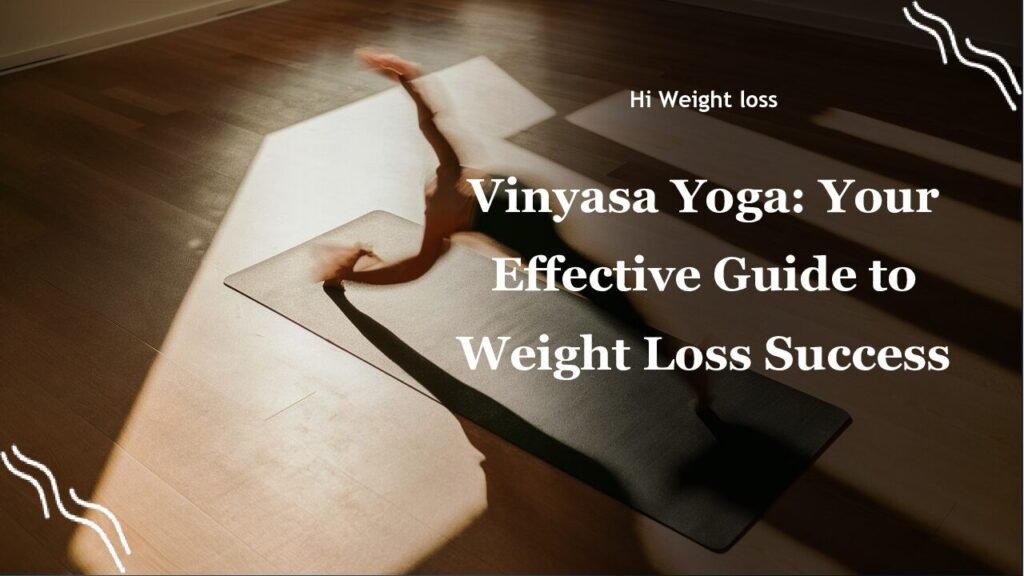“`
Feeling like your weight loss journey is a constant uphill battle? Maybe you’ve tried countless diets and intense workouts, but the results are just not sticking around. What if there was a gentler, more holistic approach? That’s what we’ll explore here. Can *yoga* truly be a path to weight loss? In this article, we’ll unravel how this ancient practice can aid your weight management efforts, using scientific evidence, personal insights, and practical tips, so you can make a more informed decision about adding *yoga* to your lifestyle.
Can You Lose Weight by Doing Yoga?
The short answer is: yes, absolutely! While yoga might not torch calories like a high-intensity cardio session, it offers a unique, multi-faceted approach to weight management. It’s about more than just burning calories; it’s about creating a healthier relationship with your body and mind. I remember a friend of mine, Sarah, who was initially skeptical about *yoga* for weight loss. She’d been a gym-goer for years, but when a knee injury sidelined her, she reluctantly tried *yoga*. Within a few months, she not only lost weight but also felt more balanced and less stressed. Her story, alongside countless others and research studies, show us that yoga can indeed be an effective method for weight loss.
How Does Yoga Aid in Weight Reduction?
So, how does *yoga* work its magic? Let’s dive into the science-backed ways that yoga supports weight loss. It’s not just about the physical postures; it’s a holistic approach that touches on various aspects of your well-being.
Firstly, *yoga* cultivates *mindful eating*. Ever notice how stress can trigger cravings? Yoga promotes a state of mindfulness, helping you become more aware of your body’s hunger cues. This increased awareness can lead to better food choices and reduce stress-related overeating. According to Live Science, the emphasis on mindfulness in yoga can help individuals develop a more positive relationship with food, indirectly supporting weight loss. I’ve found that when I practice *yoga* regularly, I’m much more attuned to my body’s actual needs rather than emotional cravings.
Secondly, *yoga* improves flexibility and strength. Yes, you read that right! Regular *yoga* practice doesn’t just make you more flexible; it also builds strength, which can boost your overall activity levels. Increased physical activity naturally leads to higher caloric expenditure, contributing to weight loss. In fact, a study by NCCIH has shown that people who participated in yoga programs can see significant weight loss and improve their cardio respiratory fitness over time. My own experience corroborates this: the more I engage with my yoga practice, the more easily I move throughout my day, leading to more activity overall.

Thirdly, *yoga* is a fantastic stress reliever. Stress is a major culprit in weight gain, and *yoga*’s stress-reducing benefits can be profound. High stress levels trigger the release of cortisol, which can cause increased abdominal fat and make you crave high-calorie foods. By lowering stress, *yoga* helps maintain balance in the body, making weight loss a more attainable goal. As Shvasa’s blog highlights, research shows a direct link between yoga and lower stress levels, which in turn supports weight loss efforts. I’ve personally found that when I’m feeling overwhelmed, a short yoga session works wonders to calm my mind and helps me resist those impulsive snacking urges.
Fourth, regular *yoga* sessions can increase *muscle tone*. While not the same as weight training, yoga poses can strengthen and tone your muscles. Increased muscle mass can boost your metabolism, helping your body burn more calories even when you’re at rest, which aids in weight management. I think, of it like this: the more muscle you have, the more efficient your body is at burning fuel, and when coupled with cardio, this can be a very effective formula for weight loss!
Lastly, let’s consider the power of routine and community. *Yoga* classes often involve group sessions and a structured practice routine, providing a strong support system. This social aspect can help you stay motivated and consistent with your weight loss efforts. The sense of accountability and encouragement can be the key to maintaining long-term progress. As a person, I know having that community support is invaluable when pursuing something like a weight loss program, and *yoga* can absolutely offer that support.
Can Practicing Yoga Lead to Significant Weight Loss?
Now, let’s talk about *significant weight loss*. Can *yoga* really help you see the numbers on the scale go down? Yes, absolutely! But, it’s important to understand that it’s not about a quick fix. It’s about consistent practice, a healthy diet, and a balanced lifestyle. According to the National Center for Complementary and Integrative Health, studies have shown that participants in yoga programs, specifically those practicing restorative hatha or vinyasa *yoga*, can lose significant amounts of weight and improve their cardiorespiratory fitness over a 6-month period.
But it’s not just about the physical practice. The holistic approach of *yoga* encompasses so many things including *mindfulness*, *stress reduction*, and a stronger mind-body connection, that it makes it a powerful ally in your weight loss journey. I know I’ve observed people who, because of these things, make healthier food choices and make it a point to stay active.
To maximize weight loss with *yoga*, you might want to explore different styles of yoga. *Vinyasa yoga*, for example, is more dynamic and can burn more calories, while *restorative yoga* can help with stress reduction and relaxation. The key is finding a balance that works best for you, your body, and your needs. Don’t forget to pay attention to your nutrition and keep the movement going in your day; *yoga* is great, but it’s one part of the equation.
| Benefit of Yoga | Description |
|---|---|
| Mindful Eating | Promotes awareness of hunger cues, reducing stress eating. |
| Improved Flexibility and Strength | Increases physical activity levels and caloric expenditure. |
| Reduced Stress | Lowers cortisol levels, decreasing abdominal fat and cravings. |
| Increased Muscle Tone | Enhances metabolism, aiding in calorie burning. |
| Behavioral Changes | Provides a support system and motivation for weight loss. |
Conclusion
In summary, *yoga* is not just a flexibility exercise, but a multifaceted practice that can significantly contribute to weight loss. From promoting *mindful eating* to reducing stress, improving strength, and fostering positive behavioral changes, *yoga* offers a holistic approach to weight management. Remember Sarah, my friend who was initially skeptical? She ended up discovering that yoga was not only a good way for her to lose weight but also to reduce her overall stress, a win-win situation, and a great example of what yoga can do for us. While *yoga* might not burn calories as quickly as some high-intensity workouts, its numerous benefits can help you achieve sustainable weight loss and a healthier overall lifestyle. It’s about more than just the numbers on the scale; it’s about a deeper, more balanced connection with yourself. Ready to start your own *yoga* journey? Why not try a class or begin a simple daily routine. Your body and mind will thank you!
FAQ
How often should I practice yoga to lose weight?
Aim for at least 3-5 times a week. Consistency is key. You can gradually increase the frequency as your body adapts.
What type of yoga is best for weight loss?
Vinyasa or power yoga can help burn more calories, while restorative yoga can assist with stress reduction. A combination of both might be beneficial.
Can I lose weight with yoga alone, or should I combine it with other exercises?
Yoga alone can contribute to weight loss, but combining it with other forms of cardio exercise and a balanced diet can lead to more significant results.
How long will it take to see results?
Results vary, but with consistent practice and a healthy diet, you may start noticing some changes within a few weeks. Significant weight loss may take a few months.
Do I need to be flexible to start yoga?
Absolutely not! Flexibility will improve with practice. Yoga is about meeting yourself where you are and progressing at your own pace.
“`



